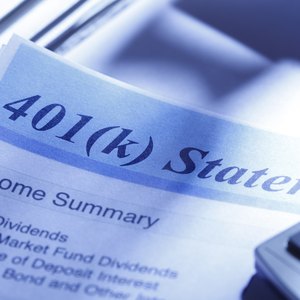
The closing cost requirements for purchasing a home have increased significantly since the Great Recession ended in 2009. The loose terms and 1 percent low down-payment policies of the previous decade have been replaced by a more conservative lending approach that requires down payments equal to 20 percent of the purchasing price of a house. Some home buyers are turning to their 401k retirement accounts for the extra money they might now need to buy a home.
Tips
If you need additional money to cover the closing costs on your home, you can use funds from your 401k as part of a loan. However, you may encounter penalties from the IRS if you are unable to pay back the loan due to termination of your current employment.
Obtain a 401k loan
Obtaining a loan from your 401k account is an option you can use to get the money you need for closing costs. The maximum loan amount the IRS permits is 50 percent of the account balance up to $50,000. Flexible repayment terms are allowed for those using the money to purchase a house that can exceed the five-year repayment limit for loans taken out for different reasons. Loans to purchase homes are not taxable as long as they are paid back. The IRS requires that at least quarterly payments are made to keep the loan current.
Assess Hardship Distribution
You can usually receive a hardship distribution when the house will serve as your principal residence, and you don’t have any other way to obtain the money to cover the down payment and closing costs. The distribution amount is limited to the amount of money necessary to alleviate the financial hardship of purchasing the home. The IRS requires that you utilize all the distribution options the 401k plan offers before you are eligible for a hardship distribution – including taking out all the nontaxable loans the plan might offer.
Analyze Withdrawal Penalties
The IRS can impose penalties in the event your employment gets terminated and you can't pay the loan off. If your employment is terminated prior to the loan being repaid, then the outstanding balance usually becomes due within 30 to 60 days of your termination date. Any amounts still outstanding after this time can be treated by the IRS as an early withdrawal from the 401k and subject the outstanding loan amount to incomes taxes and penalties. An early withdrawal penalty of 10 percent is normally assessed on the outstanding balance.
Explore Retirement Considerations
401k plans were developed to help you save money for your retirement years. Taking a distribution from your 401k account can adversely affect the amount of money you could have accumulated in the account if you had left it alone. This is especially true for hardship distributions that don’t have to be paid back. Understanding how a distribution affects you over the long term may help you decide if using money from your 401k account to purchase a home will serve your best interests later in life.
References
- RISMedia: Home Sweet Loan - Using a 401(k) Loan for a Down Payment
- Lending Tree: 7 Disadvantages of Borrowing From Your 401(k)
- Internal Revenue Service: Retirement Plans FAQs Regarding Hardship Distributions
- Fidelity. "Fidelity Q4 2019 Retirement Analysis." Accessed April 22, 2020.
- U.S. Congress. "H.R. 748, " Sec. 2202. Accessed April 22, 2020.
- Internal Revenue Service. "Retirement Topics - Hardship Distributions." Accessed April 22, 2020.
- Internal Revenue Service. "Relief for taxpayers affected by COVID-19 who take distributions or loans from retirement plans." Accessed Jun. 22, 2020.
- Internal Revenue Service. "Retirement Topics - Plan Loans." Accessed April 22, 2020.
- Internal Revenue Service. "Considering a Loan from Your 401(k) Plan?" Accessed April 22, 2020.
Writer Bio
Griffith Pritchard served as a senior branch manager and banking officer for M&T Bank. He specialized in small business and personal financial, credit and banking products. He also has extensive experience in small business sales and non-profit management. Pritchard is a graduate of Hobart College.

